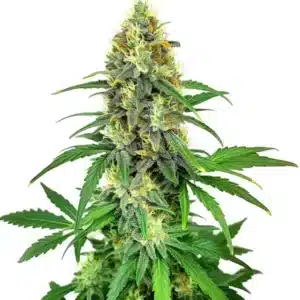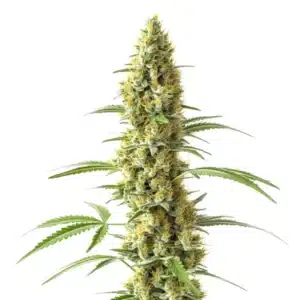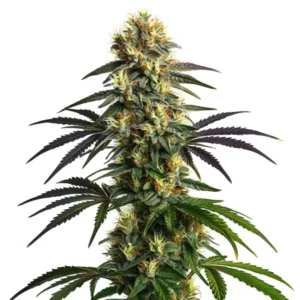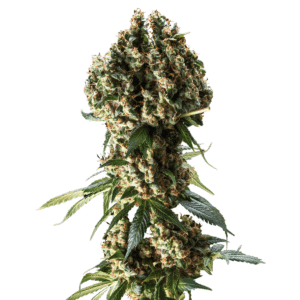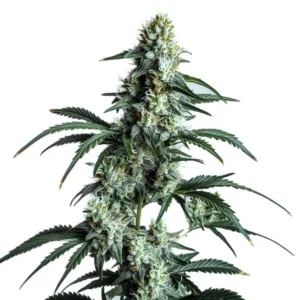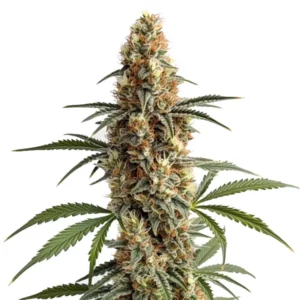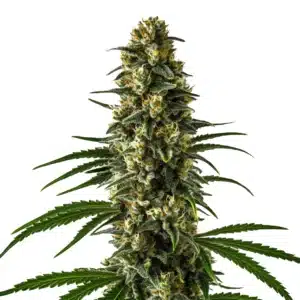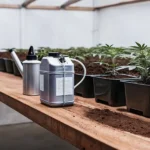
Best Nutrients to Reduce Oxidative Stress in Cannabis
Oxidative stress in cannabis can be a real bummer for growers. It happens when there’s an imbalance between free radicals and antioxidants. Free radicals are like tiny bulls in a china shop, causing damage to the plant cells. To keep your cannabis plants thriving, it’s crucial to manage oxidative stress effectively, and knowing the best nutrients to reduce oxidative stress in cannabis can make all the difference in maintaining healthy growth and high yields.
One way to combat this issue is by using the best nutrients to reduce oxidative stress in cannabis. These nutrients help balance the free radicals and antioxidants, preserving the health and vitality of your plants. By integrating a robust nutrient regimen, you can ensure your cannabis grows strong and healthy.
Recommended Strains
Blue Dream
|
|
THC | 17% - 24% (Medium) |
|
|
Type | Feminized |
|
|
Yield | High |
|
|
Phenotype | 50% Indica / 50% Sativa |
GG4
|
|
THC | 27% (High) |
|
|
Type | Feminized |
|
|
Yield | High |
|
|
Phenotype | 40% Indica / 60% Sativa |
Whether you’re nurturing a single plant or an entire crop, knowing which nutrients to use can make a significant difference. Let’s dive into the world of antioxidants and how they play a role in maintaining the health of your cannabis plants.
Best Antioxidants for Cannabis Oxidative Stress
Antioxidants are compounds that protect plants by neutralizing free radicals. They act as a shield against the potential damage these radicals can cause. The best antioxidants for cannabis oxidative stress include vitamins C and E, as well as carotenoids.
Vitamin C is water-soluble, meaning it dissolves in water and is readily absorbed by the plant. It acts as a frontline defense against oxidative damage. Vitamin E, on the other hand, is fat-soluble and works within the cell membranes, offering a different layer of protection. Carotenoids are pigments that provide another level of defense, absorbing harmful light and neutralizing radicals.
Besides to vitamins C and E, flavonoids are another group of antioxidants that can be highly beneficial. These compounds work synergistically with other antioxidants to enhance the plant’s defense against oxidative stress. Flavonoids also contribute to the overall health of the plant by improving its ability to cope with environmental changes.
Polyphenols, often found in the plant’s leaves and stems, are also effective in combating oxidative stress. They help stabilize free radicals and prevent them from causing cellular damage. By incorporating these antioxidants into your growing strategy, you’re ensuring your cannabis plants have a comprehensive defense system.
Effective Nutrients for Cannabis Oxidative Stress Reduction
Integrating effective nutrients for cannabis oxidative stress reduction is essential for a productive grow. These nutrients not only protect but also boost plant growth. Zinc, magnesium, and selenium are vital players in this process.
Zinc is crucial for the synthesis of protective enzymes. It helps in repairing damaged proteins and maintaining cell integrity. Magnesium plays a pivotal role in photosynthesis, the process by which plants convert light into energy. This energy is necessary for the production of antioxidants.
Calcium is another vital nutrient that supports cell wall structure and stability, providing physical protection against oxidative stress. It also plays a role in signaling pathways that activate the plant’s stress response mechanisms. Ensuring an adequate supply of calcium can enhance the resilience of your cannabis plants.
Iron is essential for the synthesis of chlorophyll and is involved in various enzymatic reactions. It facilitates the plant’s energy production and metabolism, ensuring optimal growth conditions. By focusing on these effective nutrients for cannabis oxidative stress reduction, growers can maintain robust and thriving plants.
Promos & Deals
Top Nutrients to Combat Oxidative Stress in Cannabis
Choosing the right nutrients can make all the difference in combating oxidative stress. Nitrogen, phosphorus, and potassium, often referred to as NPK, are the foundation of plant nutrition. They support various functions, including the synthesis of antioxidants.
Nitrogen is essential for the growth of leaves and stems, helping the plant produce chlorophyll. Phosphorus is vital for energy transfer and storage, while potassium regulates water and nutrient movement within the plant. Together, they form a potent trio for reducing oxidative stress.
Incorporating micronutrients such as copper and manganese can further optimize the plant’s ability to combat oxidative stress. Copper is involved in the formation of lignin, which strengthens plant tissues and enhances resistance to stress. Manganese plays a role in the breakdown of carbohydrates and nitrogen assimilation, contributing to overall plant health.
Another key player is sulfur, which aids in the formation of amino acids and proteins. These components are crucial for the plant’s defense mechanisms against oxidative damage. By integrating these top nutrients to combat oxidative stress in cannabis, growers can ensure their plants are well-equipped to handle environmental challenges.
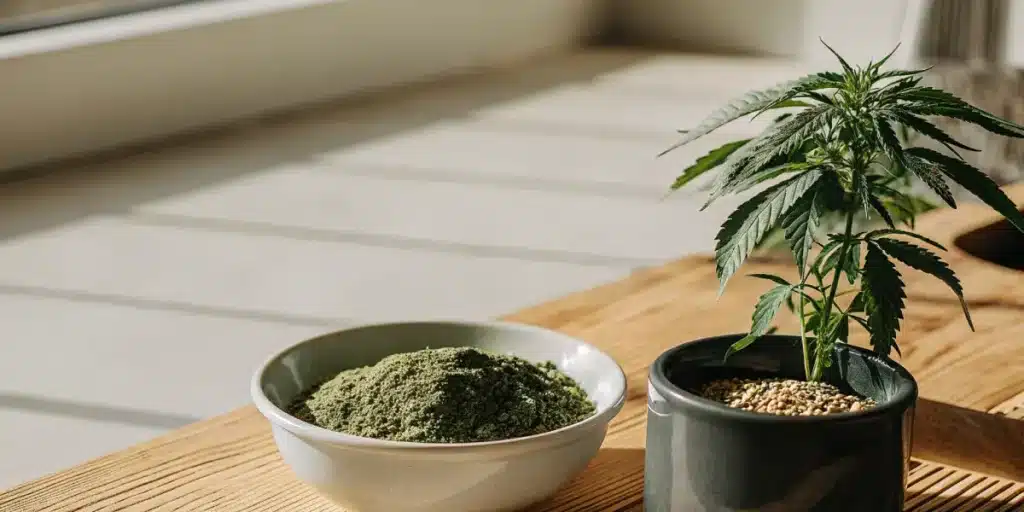
Essential Vitamins for Minimizing Oxidative Stress in Cannabis
Vitamins play a significant role in maintaining the health of cannabis plants. Vitamin B complex, including B1 (thiamine) and B6 (pyridoxine), supports stress resistance and metabolic functions. These vitamins help in the synthesis of amino acids and other vital compounds.
These essential vitamins for minimizing oxidative stress in cannabis can be supplemented through various means. Organic compost, foliar sprays, and nutrient-rich soils are excellent sources. By ensuring your plants receive these vitamins, you promote a robust defense against oxidative damage.
Vitamin D, although not traditionally associated with plants, can influence their growth when provided through specific light conditions. It regulates calcium uptake, which is important for cell structure and stability, indirectly contributing to the plant’s ability to handle oxidative stress.
Moreover, Vitamin K plays a role in photosynthesis and energy transfer processes. It helps in maintaining the efficiency of the plant’s metabolic functions, which are crucial for stress management. By incorporating these essential vitamins, growers can create a nurturing environment for their cannabis plants.
Real-Life Examples and Strains
Applying these nutrients can be seen in various cannabis strains. For instance, the Blue Dream strain is known for its resilience and robust growth. By integrating these nutrients, growers have reported healthier plants and improved yields.
Another popular strain, GG4, benefits from a nutrient-rich environment. Proper nutrient management can enhance its already potent characteristics, making it a favorite among growers.
Strains like Sour Diesel have shown remarkable improvements in growth and yield when supplied with the best nutrients to reduce oxidative stress in cannabis. With a balanced nutrient regimen, this strain can achieve its full potential.
The Granddaddy Purple strain also thrives under optimal nutrient conditions. Growers focusing on reducing oxidative stress have noticed an increase in bud quality and overall plant health, showcasing the importance of nutrient management.

FAQs
What are the best nutrients to reduce oxidative stress in cannabis?
The best nutrients to reduce oxidative stress in cannabis include antioxidants like vitamins C and E, carotenoids, and essential minerals such as zinc, magnesium, and selenium. These nutrients work in tandem to neutralize free radicals, repair cellular damage, and support overall plant health.
By ensuring your cannabis receives these nutrients, you can significantly reduce oxidative stress. This not only helps in maintaining plant vitality but also enhances the quality and yield of your cannabis crop.
Besides to these, incorporating trace elements like manganese and copper can further enhance the plant’s ability to manage oxidative stress. These elements aid in enzymatic processes vital for the plant’s defense mechanisms.
Another approach is using organic amendments that promote soil health, indirectly supporting the plant’s oxidative stress management. Healthy soil encourages beneficial microbial activity, enhancing nutrient availability and absorption.
How do antioxidants help in reducing oxidative stress in cannabis plants?
Antioxidants are crucial in reducing oxidative stress by neutralizing free radicals, which are unstable molecules that can damage plant cells. Vitamins C and E, along with carotenoids, provide a protective barrier, preventing cellular damage and promoting plant health.
Incorporating antioxidants into your nutrient regimen ensures that your cannabis plants remain resilient against environmental stressors. This leads to healthier growth and more robust yields.
Antioxidants also help in the repair of damaged cells, facilitating recovery from environmental stresses. This recovery is essential for maintaining continuous growth and development in cannabis plants.
Furthermore, antioxidants can enhance the plant’s immune response, allowing it to resist pathogens and pests more effectively. This comprehensive approach to oxidative stress reduction ensures long-term plant vitality.
Are there specific cannabis strains that benefit more from oxidative stress reduction?
Certain cannabis strains, such as Blue Dream, GG4, and OG Kush, show significant improvements when oxidative stress is managed effectively. These strains respond well to nutrient-rich environments and antioxidant supplementation.
Growers have reported improved plant resilience and yield quality by focusing on reducing oxidative stress. Tailoring your nutrient strategy to these strains can lead to exceptional results.
Strains like White Widow and Northern Lights are also known for their positive response to nutrient management aimed at reducing oxidative stress. These strains can achieve their full potential under carefully monitored growing conditions.
Additionally, strains with genetic predispositions to environmental stress, such as Durban Poison, benefit greatly from a focus on oxidative stress management. This approach ensures optimal growth and high-quality yields.
What role do minerals play in reducing oxidative stress in cannabis?
Minerals like zinc, magnesium, and selenium are essential in reducing oxidative stress. Zinc aids in enzyme production and protein repair, whereas magnesium supports photosynthesis, a process critical for energy production and antioxidant synthesis.
Selenium enhances the activity of antioxidant enzymes, providing another layer of defense against oxidative damage. Integrating these minerals ensures your cannabis plants have a robust defense mechanism against stress.
Other minerals such as calcium and boron are also involved in reducing oxidative stress by supporting cell wall integrity and facilitating nutrient transport. This structural support is vital for maintaining plant health under stress conditions.
Ensuring a balanced mineral supply helps in optimizing the plant’s metabolic pathways, which are essential for efficient energy use and stress response. This holistic approach contributes to a resilient and productive cannabis crop.
Can nutrient supplementation replace natural growing conditions for cannabis?
Nutrient supplementation is not a replacement for natural growing conditions but rather a complement. While it’s essential to provide your plants with the best nutrients to reduce oxidative stress, ensuring optimal growing conditions is equally crucial.
Natural factors such as sunlight, water, and soil quality play a significant role in plant health. By combining the right nutrients with ideal growing conditions, you can achieve the best results for your cannabis cultivation.
Environmental control, such as regulating temperature and humidity, also plays a crucial role alongside nutrient management. These factors work together to create a stable and supportive environment for plant growth.
Moreover, integrating organic practices like crop rotation and companion planting can enhance soil health and biodiversity, further supporting the plant’s ability to manage oxidative stress naturally.




